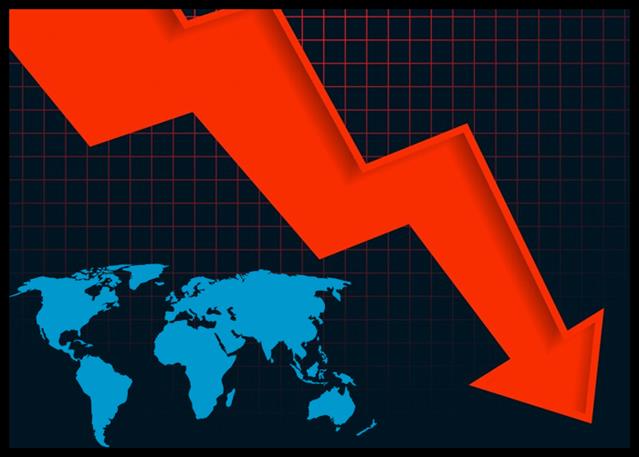Asian Markets Track Wall Street Lower
Asian stock markets are trading mostly lower on Monday, following the broadly negative cues from Wall Street on Friday, amid widespread selling on concerns about inflation, uncertainty about the likel...

Asian stock markets are trading mostly lower on Monday, following the broadly negative cues from Wall Street on Friday, amid widespread selling on concerns about inflation, uncertainty about the likely timing of interest rate cuts, and rising geopolitical tensions in the middle-east where Iran launched retaliatory attack on Israel. Asian markets closed mostly lower on Friday.
The Australian stock market is currently trading notably lower on Monday, adding to the losses in the previous two sessions, with the benchmark S&P/ASX 200 staying below the 7,800.00 level, following the broadly negative cues from Wall Street on Friday, with weakness across most sectors led by gold miners and technology stocks.
The benchmark S&P/ASX 200 Index is losing 37.90 points or 0.49 percent to 7,750.20, after hitting a low of 7,735.20 earlier. The broader All Ordinaries Index is down 44.60 points or 0.55 percent to 8,005.60. Australian stocks closed modestly lower on Friday.
Among the major miners, Rio Tinto is gaining more than 2 percent, BHP Group is adding almost 1 percent and Fortescue Metals is edging up 0.3 percent, while Mineral Resources is losing more than 1 percent.
Oil stocks are mostly higher. Santos and Woodside Energy are edging up 0.2 to 0.3 percent each, while Beach energy is gaining more than 1 percent. Origin Energy is losing almost 1 percent.
Among tech stocks, Xero and WiseTech Global are losing almost 2 percent each, while Appen is sliding more than 7 percent, Afterpay owner Block is declining 2.5 percent and Zip is slipping almost 3 percent.
Gold miners are lower. Gold Road Resources is sliding more than 6 percent, Resolute Mining is losing almost 2 percent and Newmont is slipping almost 1 percent, while Evolution Mining and Northern Star Resources are down more than 1 percent each.
Among the big four banks, Commonwealth Bank losing more than 1 percent and National Australia Bank is down almost 1 percent, while Westpac and ANZ Banking are edging down 0.4 percenteach.
In the currency market, the Aussie dollar is trading at $0.648 on Monday.
The Japanese stock market is trading significantly lower on Monday, giving up the gains in the previous session. The benchmark S&P/ASX 200 is falling well below the 39,200 level, following the broadly negative cues from Wall Street on Friday, with weakness across most sectors led by index heavyweights, financial and technology stocks.
The benchmark Nikkei 225 Index closed the morning session at 39,113.19, down 409.36 points or 1.04 percent, after hitting a low of 38,820.95 earlier. Japanese shares ended modestly higher on Friday.
Market heavyweight SoftBank Group is losing more than 2 percent and Uniqlo operator Fast Retailing is down more than 1 percent. Among automakers, Honda is declining more than 2 percent and Toyota is losing more than 1 percent.
In the tech space, Screen Holdings is declining more than 2 percent, Advantest is down 2.5 percent and Tokyo Electron is losing almost 2 percent.
In the banking sector, Sumitomo Mitsui Financial is losing almost 1 percent, Mizuho Financial is edging down 0.5 percent and Mitsubishi UFJ Financial is slipping more than 1 percent.
The major exporters are mostly lower. Canon is edging down 0.2 percent, Panasonic is losing 1.5 percent and Sony is declining more than 2 percent, while Mitsubishi Electric is edging up 0.4 percent
Among other major losers, Takashimaya is plunging more than 6 percent, Astellas Pharma is slipping almost 6 percent and Socionext is sliding almost 5 percent, while M3, Ebara, Rakuten Group, Toyota Tsusho and Mercari are losing more than 3 percent each. Lasertec, Disco, Sumitomo Pharma and Sapporo Holdings are declining almost 3 percent each.
Conversely, Mitsubishi Materials is gaining more than 3 percent, while Mitsui Mining & Smelting and Tokyo Electric Power are adding almost 3 percent each.
In economic news, the value of core machine orders in Japan jumped by a seasonally adjusted 7.7 percent on month in February, the Cabinet Office said on Monday – coming in at 886.6 billion yen. That blew away expectations for an increase of 0.8 percent following the 1.7 percent drop in January.
On a yearly basis, core machine orders slipped 1.8 percent – but that also beat forecasts for a decline of 5.0 percent after slumping 10.9 percent in the previous month. For the first quarter of 2024, core machine orders are seen higher by 4.9 percent on quarter and down 0.1 percent on year at 2,637.4 billion yen.
In the currency market, the U.S. dollar is trading in the higher 153 yen-range on Monday.
Elsewhere in Asia, New Zealand, Hong Kong, Singapore, South Korea, Malaysia and Taiwan are lower by between 0.3 and 1.2 percent each. China is bucking the trend and is up 1.4 percent. Indonesia remains closed for Eid-ul-Fitr.
On Wall Street, stocks closed sharply lower on Friday, as geopolitical tensions, inflation worries and mixed earnings and guidance from major banks rendered the mood a bit bearish.
The major averages all ended in the red. The Dow ended with a loss of 475.84 points or 1.24 percent at 37,983.24. The S&P 500 drifted down 75.65 points or 1.46 percent to 5,123.41, while the Nasdaq settled at 16,175.09 with a loss of 267.10 points or 1.62 percent.
Meanwhile, the major European markets ended mixed. The U.K.’s FTSE 100 climbed 0.91 percent, while Germany’s DAX and France’s CAC 40 ended lower by 0.13 percent and 0.16 percent, respectively.
Crude oil prices moved higher on Friday amid concerns about the outlook for supply due to rising tensions in the Middle East between Iran and Israel. West Texas Intermediate Crude oil futures for May ended higher by $0.64 at $85.66 a barrel.
- Check out our free forex signals
- Follow the top economic events on FX Leaders economic calendar
- Trade better, discover more Forex Trading Strategies
- Open a FREE Trading Account


